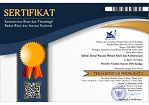Legal reasonings of religious court judges in deciding the origin of children: a study on the protection of biological children’s civil rights
Abstract
Keywords
Full Text:
PDFReferences
Abidin, I. (2003) Radd al-Muhtār ‘Alā ad-Dur al-Mukhtār Syarh Tanwīr al-Abṣār, Jilid IV. Riyadh: Dār ‘Alam al-Kutub.
Adji, O. S. (1984) Hukum Hakim Pidana. Jakarta: Penerbit Erlangga.
Al-Zuhaily, W. (1985) Al-Fiqh al-Islāmi wa ‘Adillatuh, Jilid VIII. Beirut: Dar al-Fikr.
Asnawi, M. N. (2014) Hermeneutika Putusan Hakim: Pendekatan Multidisipliner dalam Memahami Putusan Peradilan Perdata. Yogyakarta: UII Press.
Bakar, A. et al. (2017) ‘Registration Problems of Illegitimate Children among Muslims in Malaysia’, Journal of Islamic Studies and Culture, 5(1), pp. 9–15.
Banjarmasin, P. A. (2014) Salinan Penetapan Nomor 0403/Pdt.P/2014/PA.Bjm. Indonesia: Direktori Putusan Mahkamah Agung Republik Indonesia. Available at: putusan.mahkamahagung.go.id.
Butt, S. (2012) ‘Asia Pasific “Illegitimate” Children and Inheritance in Indonesia’, Legal Studies Research Paper, 12(63).
Efendi, J. (2018) Rekonstruksi Dasar Pertimbangan Hukum Hakim Berbasis Nilai-Nilai Hukum dan Rasa Keadilan yang Hidup dalam Masyarakat. Depok: Prenadamedia Group.
Hardjon, P. M. and Djatmiati, T. S. (2005) Argumentasi Hukum. Yogyakarta: Gajahmada University Press.
Ilma, M. (2016) Penetapan Hakim Tentang Asal Usul Anak Pasca Putusan Mahkamah Konstitusi Nomor 46/PUU-VIII/2010 (Studi Kasus di Pengadilan Agama Bantul). Yogyakarta.
Indonesia, K. Y. R. (2014) Disparitas Putusan Hakim Ïdentifikasi dan Implikasi. Jakarta.
Junaidi, A. (2013) Wasiat Wajibah: Pergumulan antara Hukum Adat dan Hukum Islam di Indonesia. Yogyakarta: Pustaka Pelajar.
Magetan, P. A. (2014) Salinan Penetapan Nomor 0078/Pdt.P/2014/PA.Mgt. Indonesia: Direktori Putusan Mahkamah Agung Republik Indonesia. Available at: putusan.mahkamahagung.go.id.
Malang, P. A. (2015) Salinan Penetapan Nomor 0316/Pdt.P/2015/PA.Mlg. Indonesia: Direktori Putusan Mahkamah Agung Republik Indonesia. Available at: putusan.mahkamahagung.go.id.
Marilang (2016) ‘Legal Relationship Between Illegitimate Children and Their Biological Father: The Analysis of Constitutional Court Decree No. 46/PUU-VIII/2010 in the Perspective of Civil and Islamic Law’, Journal Of Indonesian Islam, 10(2), pp. 335–354.
Mertokusumo, S. and Pitlo, A. (1993) Bab-Bab tentang Penemuan Hukum. Bandung: Citra Aditya Bakti.
Mokoginta, B. (2017) Perlindungan Hak-Hak Keperdataan Anak Luar Kawin Dalam UU No. 1 Tahun 1974 Tentang Perkawinan Pasca Putusan Mahkamah Konstitusi No. 46/PUU-VIII/2010. UIN Sunan Kalijaga Yogyakarta.
Nafis, M. W. (1995) Kontekstualisasi Ajaran Islam. Jakarta: IPHI-Paramadina.
Nasution, K. (2016) ‘Perlindungan terhadap Anak dalam Hukum Keluarga Islam Indonesia’, Al-’Adalah, 13(1), pp. 1–10.
Nurlaelawati, E. and Van Huis, S. C. (2019) ‘The Status of Children Born Out of Wedlock and Adopted Children in Indonesia: Interactions Between Islamic, Adat, and Human Rights Norms’, Journal of Law and Religion, 34(3), pp. 356–382.
Prakoso, A. (2016) Penemuan Hukum: Sistem, Metode, Aliran dan Prosedur dalam Menemukan Hukum. Yogyakarta: LaksBang PRESSindo.
Pusat, P. A. J. (2014) Salinan Penetapan Nomor 0043/Pdt.P/2014/PA.JP. Indonesia: Direktori Putusan Mahkamah Agung Republik Indonesia. Available at: putusan.mahkamahagung.go.id.
Rahardjo, S. (2007) Membedah Hukum Progresif. Jakarta: Kompas.
Rifai, A. (2014) Penemuan Hukum Oleh Hakim, Dalam Perspektif Hukum Progresif. Jakarta: Sinar Grafika.
Rodes, R. E. J. and Pospesel, H. (1997) Premises and Conclusions, Symbolic Logic for Legal Analysis. New Yersey: Prentice Hall.
Rosyad, S. (2017) ‘Status Hukum Anak di Luar Perkawinan dalam Hukum Islam dan Implementasinya dalam Perkembangan Peraturan Perundang-Undangan di Indonesia (Studi Tentang Putusan Mahkamah Konstitusi)’, Jurnal Hukum Islam, 15(1), pp. 155–179.
Saifullah (2014) ‘Kajian Kritis Teori Hukum Progresif Terhadap Status Anak Luar Nikah Dalam Putusan Mahkamah Konstitusi No. 46/PUU-VIII/2010’, Al-Manahij, 8(2).
Sarifudin (2015) Teori Maslahat At-Tufi dan Penerapannya, Dalam Analisis Kasus Putusan Mahkamah Konstitusi Nomor 46/PUU-VIII/2010 tentang Status Anak di Luar Perkawinan. UIN Sunan Kalijaga Yogyakarta.
Sarmadi, A. S. (2012) ‘Membebaskan Positivisme Hukum Ke Ranah Hukum Progresif (Studi Pembacaan Teks Hukum Bagi Penegak Hukum)’, Jurnal Dinamika Hukum, 12(2).
Satrio, J. (2005) Hukum Keluarga tentang Anak dalam Undang-Undang. Bandung: Alumni.
Schlumpf, E. (2016) ‘The Legal Status of Children Born Out of Wedlock in Morocco’, Electronic Journal of Islamic and Middle Eastern Law (EJIMS), 4, pp. 1–26.
Shidarta (2013) Hukum Penalaran dan Penalaran Hukum: Akar Filosofis. 1st edn. Yogyakarta: Genta Publishing.
Sidharta, B. A. (2004) ‘Kajian Kefilsafatan tentang Negara Hukum’, Jurnal Hukum Jentera, , Pusat Studi Hukum dan Kebijakan (PSHK), Jakarta, 3(2).
Sujono, I. N. (2015) Kedudukan Hukum Anak Luar Kawin dalam Perspektif Putusan Mahkamah Konstitusi Nomor/46/PUU-VIII/2010. Surabaya: Aswaja Pressindo.
Tanya, B. L. (2010) Teori Hukum, Strategi Tertib Manusia Lintas Ruang dan Generasi. Yogyakarta: Genta Publishing.
Tobroni, F. (2018) ‘Asas Proporsionalitas Sebagai Moderasi Pandangan Hukum Diametral (Kajian Putusan Nomor 0156/Pdt.P/2013/PA.JS)’, Jurnal Yudisial, 11(3), pp. 307–325.
Trenggalek, P. A. (2014) Salinan Penetapan Nomor 0185/Pdt.P/2014/PA.TL. Indonesia: Direktori Putusan Mahkamah Agung Republik Indonesia. Available at: putusan.mahkamahagung.go.id.
Usma, R. (2019) Hukum Pencatatan Sipil. Jakarta: Sinar Grafika.
Wahyudi, M. . (2017) ‘Judges’ Legal Reasoning on Child Protection: Analysis of Religious Courts’ Decisions on the Case of Child Parentage’, Al-Jami’ah: Journal of Islamic Studies, 55(1), pp. 127–154.
DOI: https://doi.org/10.18326/ijtihad.v21i1.1-20
Refbacks
- There are currently no refbacks.

This work is licensed under a Creative Commons Attribution-ShareAlike 4.0 International License.
Ijtihad: Jurnal Wacana Hukum Islam dan Kemanusiaan by http://ijtihad.iainsalatiga.ac.id/ is licensed under a Creative Commons Attribution-ShareAlike 4.0 International License







